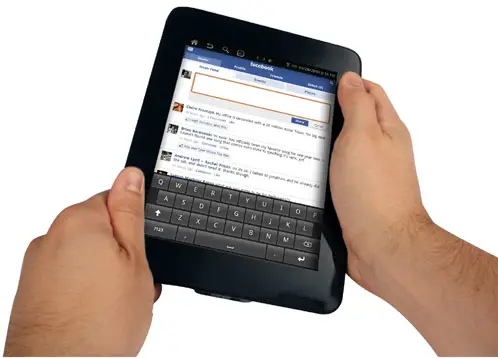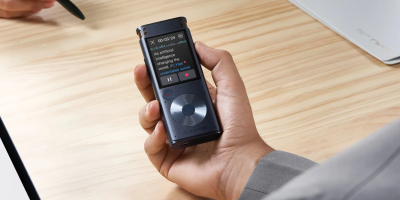
While bigger Android manufacturers like Motorola and Barnes & Noble have decided to fight off Microsoft’s attempts to cash in on supposedly-infringed patents, smaller companies just don’t have the luxury to afford a drawn-out legal battle with one of the nation’s largest companies. It’s much easier for them to simply pay Microsoft the fees they demand, and that’s exactly what Velocity Micro and General Dynamics have decided to do.
Both companies produce low-cost Android tablets, and Velocity Micro’s CEO says the agreement reached with Microsoft will allow the company to “better meet the needs of [their] customers.” The amounts they will pay for licensing are undisclosed, but a similar deal sees HTC giving MS $5 for each handset sold. It all adds up to why Microsoft earns more on Android licensing than they do on their own Windows Phone 7 devices.
[via CrunchGear]










Microsoft is nothing but a hypocritical, evil company. It was only a few weeks ago they stated they were concentrating on reforming the patent system because some company did to them what Microsoft is doing to every Tom, Dick and Harry (ref: http://www.theregister.co.uk/2011/06/09/microsoft_loses_supreme_battle_to_i4i/). Microsoft need to grow up and bring some innovation to the table instead of trying to bring innovative companies to the ground and hampering technology progress for everyone. (And Apple is no better).
Apple and Microsoft need to get a life… Just because you invent a chair does not mean that you should get paid for all other chairs ever built. I am tired of all the law suits being thrown around… Make a product!!! If people like it they will buy it…
I invented this argument! You owe me!
But seriously, I agree. They need to back off and let people be. I understand IP infringements, but in a broad sense like most of these are, its just moronic to continue.
So, when someone invents something, patents it and markets it, it shouldn’t be theirs? Someone else should be able to copy said invention and sell it for a profit, and not have to pay the original guy any money…
Sounds like you need a reality check on what capitalism is and how laws protect the little guy against companies just taking their stuff (see the Microsoft lawsuit with i4i… MS had to pay them $290 million for a few lines of code that were really rather generic… http://www.pcworld.com/businesscenter/article/185347/microsoft_loses_lawsuit_but_word_likely_to_stay.html
The fact of the matter is, Microsoft had a great way of doing something, and these manufacturers decided to try and do it without licensing the tech. Sure, $5 a phone may seem like a lot, but on a $500 device, it’s 1% of the retail price for all that functionality.
“how laws protect the little guy against companies just taking their stuff (see the Microsoft lawsuit with i4i… MS had to pay them $290 million for a few lines of code that were really rather generic”
Thank you for providing the perfect argument for how completely the software patent system is broken. Code and functionality — no matter how generic — can be patented and cashed in on with nothing actually being produced. IP law exists to protect innovation (according to the U.S. Constitution). But when generic code and obvious functionality is patented, innovation is throttled.
These smaller companies can’t afford to fight for their rights against a behemoth like MS. So much for “protecting the little guy.”
Finally, it’s only 1% FOR NOW. What happens when Apple, Cisco, IBM, and Intel decide they want to cash in on some ridiculous, vague patents of their own? Suddenly the smaller companies – who can’t afford to fight these lawsuits — are out of business. And THAT’S the real goal behind MS and Apple buying up massive patent portfolios: protecting market share through lawsuits rather than innovation.
there’s a difference between that and patent trolling
Also too I think one the reasons why Apple paid Microsoft is so that both can raise the barrier to entry into the market meaning that only bigger OEM players can make it worthwhile to make devices. Apple and Microsoft come in at a disadvantage since both will always price higher than an Android device since they have higher operational costs.
It’s ridiculous that Apple and Microsoft can sue for IP infringements. The thing is Steve Jobs stole windows from Xerox but failed to develop a finished product faster then Bill Gates who stole windows from Steve Jobs. Now Bill Gates sues everyone for IP infringement of his stolen product.
Bill Gates is no longer the CEO of Microsoft. He is off saving the world I guess.
Saving the world, one lawsuit at a time…
The big companies have a much easier time in handling this than do the smaller guys. The big companies reach a negotiated agreement on the value of each others patent portfolio (often times with a law suit involved), and then pay the one on the stronger end the difference in cash on a yearly basis. Simple enough, and the amount of cash is usually not all that much. Smaller companies without a large patent portfolio, though, lose out big time. So, the big get bigger and the small, well, get smaller.
Google needs to start protecting their Android manufacturers.
Just sue apple for their notification thing and give the money to android manufacturers to even it out.